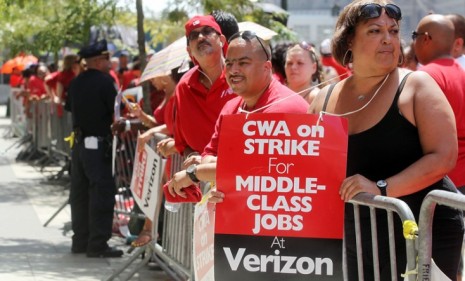The 'horrific' August jobs report
The U.S. economy failed to add any new jobs last month — the worst showing in nearly a year. Does the report offer anything resembling a silver lining?

A free daily email with the biggest news stories of the day – and the best features from TheWeek.com
You are now subscribed
Your newsletter sign-up was successful
Zero. That's the number of jobs that were added to the U.S. economy in August, according to a report released Friday morning by the Labor Department. Though economists had expected a modest gain of 60,000 jobs — far fewer than the 150,000-plus new jobs needed each month for a real recovery — they were greeted instead with news of "economic paralysis." The report also noted losses in the manufacturing and retail sectors — previously engines of growth — and a decline in average income. The unemployment rate remained at 9.1 percent. Just how "horrific" is this news?
This report isn't as bad as it looks: There's "one huge caveat," says Andrew Leonard at Salon. "The Verizon strike in August accounted for a net (and temporary) loss of 45,000 jobs." Take into account that 17,000 government jobs were eliminated in August, and the economy actually saw a net gain of 62,000 private sector jobs. While that's hardly robust, it "suggests there are some feeble signs of growth visible in the U.S. economy."
The Week
Escape your echo chamber. Get the facts behind the news, plus analysis from multiple perspectives.

Sign up for The Week's Free Newsletters
From our morning news briefing to a weekly Good News Newsletter, get the best of The Week delivered directly to your inbox.
From our morning news briefing to a weekly Good News Newsletter, get the best of The Week delivered directly to your inbox.
Actually, it is very, very bad: "Pay little attention to those who say the August jobs report isn't as bad as it looks because of the Verizon strike," says Jay Hancock in The Baltimore Sun. Even with those 45,000 jobs, the economy is seeing far too little growth. And the future looks bleak, especially considering the decline in consumer confidence. Also worrying: The Labor Department downgraded its previous estimates for July and June. July's new jobs were slashed from 117,000 to 85,000, and June was downgraded from 46,000 to 20,000. "Miserable."
"Another miserable jobs report"
Well, what else do you expect? "The striking zero result should galvanize minds," says Matthew Yglesias at ThinkProgress, "but it's worth noting that this has been the trend all year." Indeed, "the public sector has been steadily shrinking" as conservatives slash government jobs. "The Conservative Recovery" theory is that a shrinking public sector can "super-charge the private sector," but that's just not how the economy works. Instead, we should be "forcefully trying to avoid public sector layoffs, knowing that workers are also customers for the private sector."
"The conservative recovery teeters into recession"
A free daily email with the biggest news stories of the day – and the best features from TheWeek.com
-
 6 exquisite homes with vast acreage
6 exquisite homes with vast acreageFeature Featuring an off-the-grid contemporary home in New Mexico and lakefront farmhouse in Massachusetts
-
 Film reviews: ‘Wuthering Heights,’ ‘Good Luck, Have Fun, Don’t Die,’ and ‘Sirat’
Film reviews: ‘Wuthering Heights,’ ‘Good Luck, Have Fun, Don’t Die,’ and ‘Sirat’Feature An inconvenient love torments a would-be couple, a gonzo time traveler seeks to save humanity from AI, and a father’s desperate search goes deeply sideways
-
 Political cartoons for February 16
Political cartoons for February 16Cartoons Monday’s political cartoons include President's Day, a valentine from the Epstein files, and more